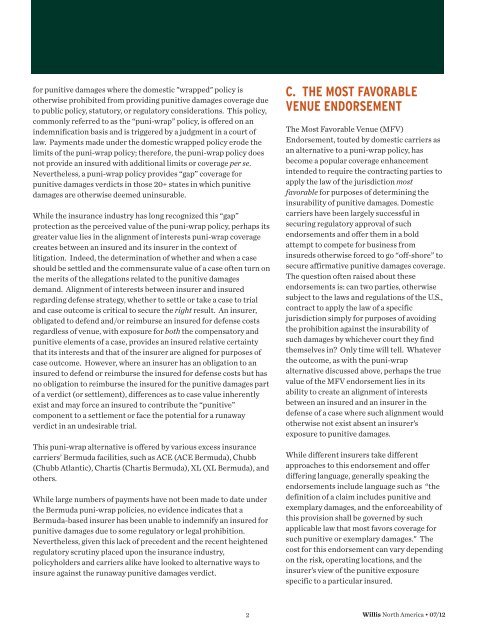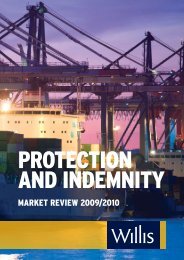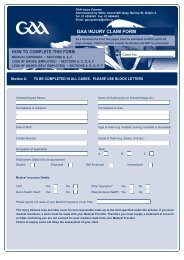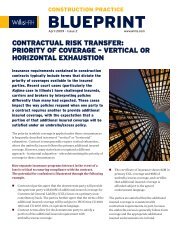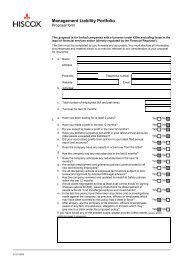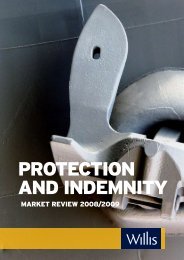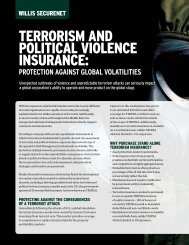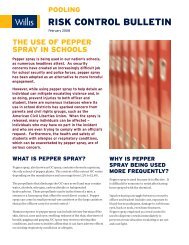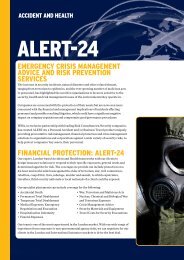THE INSURABILITY OF PUNITIVE DAMAGES – A PRIMER - Willis
THE INSURABILITY OF PUNITIVE DAMAGES – A PRIMER - Willis
THE INSURABILITY OF PUNITIVE DAMAGES – A PRIMER - Willis
You also want an ePaper? Increase the reach of your titles
YUMPU automatically turns print PDFs into web optimized ePapers that Google loves.
for punitive damages where the domestic "wrapped" policy is<br />
otherwise prohibited from providing punitive damages coverage due<br />
to public policy, statutory, or regulatory considerations. This policy,<br />
commonly referred to as the “puni-wrap” policy, is offered on an<br />
indemnification basis and is triggered by a judgment in a court of<br />
law. Payments made under the domestic wrapped policy erode the<br />
limits of the puni-wrap policy; therefore, the puni-wrap policy does<br />
not provide an insured with additional limits or coverage per se.<br />
Nevertheless, a puni-wrap policy provides “gap” coverage for<br />
punitive damages verdicts in those 20+ states in which punitive<br />
damages are otherwise deemed uninsurable.<br />
While the insurance industry has long recognized this “gap”<br />
protection as the perceived value of the puni-wrap policy, perhaps its<br />
greater value lies in the alignment of interests puni-wrap coverage<br />
creates between an insured and its insurer in the context of<br />
litigation. Indeed, the determination of whether and when a case<br />
should be settled and the commensurate value of a case often turn on<br />
the merits of the allegations related to the punitive damages<br />
demand. Alignment of interests between insurer and insured<br />
regarding defense strategy, whether to settle or take a case to trial<br />
and case outcome is critical to secure the right result. An insurer,<br />
obligated to defend and/or reimburse an insured for defense costs<br />
regardless of venue, with exposure for both the compensatory and<br />
punitive elements of a case, provides an insured relative certainty<br />
that its interests and that of the insurer are aligned for purposes of<br />
case outcome. However, where an insurer has an obligation to an<br />
insured to defend or reimburse the insured for defense costs but has<br />
no obligation to reimburse the insured for the punitive damages part<br />
of a verdict (or settlement), differences as to case value inherently<br />
exist and may force an insured to contribute the “punitive”<br />
component to a settlement or face the potential for a runaway<br />
verdict in an undesirable trial.<br />
This puni-wrap alternative is offered by various excess insurance<br />
carriers’ Bermuda facilities, such as ACE (ACE Bermuda), Chubb<br />
(Chubb Atlantic), Chartis (Chartis Bermuda), XL (XL Bermuda), and<br />
others.<br />
While large numbers of payments have not been made to date under<br />
the Bermuda puni-wrap policies, no evidence indicates that a<br />
Bermuda-based insurer has been unable to indemnify an insured for<br />
punitive damages due to some regulatory or legal prohibition.<br />
Nevertheless, given this lack of precedent and the recent heightened<br />
regulatory scrutiny placed upon the insurance industry,<br />
policyholders and carriers alike have looked to alternative ways to<br />
insure against the runaway punitive damages verdict.<br />
2<br />
C. <strong>THE</strong> MOST FAVORABLE<br />
VENUE ENDORSEMENT<br />
The Most Favorable Venue (MFV)<br />
Endorsement, touted by domestic carriers as<br />
an alternative to a puni-wrap policy, has<br />
become a popular coverage enhancement<br />
intended to require the contracting parties to<br />
apply the law of the jurisdiction most<br />
favorable for purposes of determining the<br />
insurability of punitive damages. Domestic<br />
carriers have been largely successful in<br />
securing regulatory approval of such<br />
endorsements and offer them in a bold<br />
attempt to compete for business from<br />
insureds otherwise forced to go “off-shore” to<br />
secure affirmative punitive damages coverage.<br />
The question often raised about these<br />
endorsements is: can two parties, otherwise<br />
subject to the laws and regulations of the U.S.,<br />
contract to apply the law of a specific<br />
jurisdiction simply for purposes of avoiding<br />
the prohibition against the insurability of<br />
such damages by whichever court they find<br />
themselves in? Only time will tell. Whatever<br />
the outcome, as with the puni-wrap<br />
alternative discussed above, perhaps the true<br />
value of the MFV endorsement lies in its<br />
ability to create an alignment of interests<br />
between an insured and an insurer in the<br />
defense of a case where such alignment would<br />
otherwise not exist absent an insurer’s<br />
exposure to punitive damages.<br />
While different insurers take different<br />
approaches to this endorsement and offer<br />
differing language, generally speaking the<br />
endorsements include language such as “the<br />
definition of a claim includes punitive and<br />
exemplary damages, and the enforceability of<br />
this provision shall be governed by such<br />
applicable law that most favors coverage for<br />
such punitive or exemplary damages." The<br />
cost for this endorsement can vary depending<br />
on the risk, operating locations, and the<br />
insurer’s view of the punitive exposure<br />
specific to a particular insured.<br />
<strong>Willis</strong> North America • 07/12


